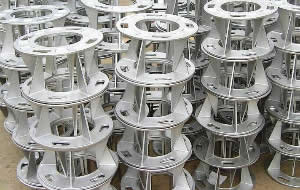Finest Practices for Upkeep and Applications in the Light Weight Aluminum Factory Industry: An In-depth Summary
Keeping devices in the light weight aluminum foundry sector is essential for operational success. Routine inspections and anticipating maintenance can considerably minimize downtime and boost security. Advanced modern technologies, such as IoT and information analytics, play a critical function in this procedure. Recognizing the full extent of best methods needs a more detailed assessment of details methods and their influences on efficiency. What are the important components that add to a reputable maintenance structure?
Significance of Routine Upkeep in Light Weight Aluminum Foundries
Routine maintenance plays an important function in the reliable operation of light weight aluminum foundries. By systematically servicing and inspecting tools, foundries guarantee peak performance and long life of equipment. Routine maintenance tasks, such as lubrication, component, and cleansing substitute, aid stop unanticipated breakdowns that can bring about expensive downtime.
In addition, routine checks improve work environment security by determining potential risks prior to they escalate right into serious concerns. Devices that is properly maintained operates better, resulting in improved item quality and lowered waste. In addition, adherence to a structured maintenance schedule can support compliance with industry policies, therefore promoting a track record for reliability and quality within the marketplace.
Executing Anticipating Maintenance Strategies
Predictive maintenance techniques take the principles of regular maintenance an action further by leveraging information analytics and progressed monitoring innovations. In light weight aluminum factories, these approaches allow operators to expect equipment failings prior to they happen, thereby minimizing unexpected downtimes and maximizing functional effectiveness. By utilizing sensing units and IoT tools, real-time data can be collected on equipment efficiency, enabling the recognition of prospective issues via anticipating analytics.
Enhancing Melting and Putting Procedures
Efficient melting and putting procedures are important for making the most of performance and guaranteeing the top quality of aluminum castings. To improve these processes, foundries need to concentrate on specific temperature control throughout melting, as this directly influences the metallurgical properties of the alloy. Using sophisticated melting modern technologies, such as induction and resistance melting, can enhance energy effectiveness and decrease cycle times.
Executing automated putting systems decreases human error and keeps consistency in the pouring procedure. Correct mold and mildew preparation, including appropriate preheating, is necessary to protect against thermal shock and improve mold durability.

Enhancing Safety And Security Methods in Shop Procedures
Focusing on security in aluminum shop procedures is crucial for shielding employees and assuring an efficient atmosphere. Efficient safety procedures consist of normal training sessions that emphasize the importance of individual safety devices (PPE), such as safety helmets, safety glasses, and handwear covers. In addition, the facility of clear emergency situation treatments is crucial in managing prospective mishaps.
Regular inspections of tools and machinery help determine risks prior to they escalate right into serious issues. Executing a robust reporting system encourages workers to interact safety issues without anxiety of repercussion. Furthermore, promoting a culture of safety warranties that every worker recognizes their function in preserving a protected workplace.
In addition, assuring appropriate air flow and monitoring air top quality can alleviate exposure to harmful fumes and dust. By reinforcing these methods, light weight aluminum factories can greatly reduce the threat of crashes and produce a setting where workers really feel valued and risk-free, inevitably enhancing overall functional efficiency.
Leveraging Modern Technology for Improved Effectiveness
Utilizing sophisticated innovation has actually come to be progressively vital for aluminum shops aiming to improve operational performance. Automation and robotics play an important duty in simplifying production processes, minimizing labor costs, and reducing human mistake. Applying real-time monitoring systems enables the continual analysis of equipment efficiency, enabling proactive maintenance and lowering downtime.
The combination of information find analytics offers important insights into functional workflows, assisting in far better decision-making and source allotment. For instance, predictive analytics can determine read this possible failures prior to they happen, further optimizing maintenance routines.
Furthermore, taking on innovative melting and casting innovations improves energy performance and product yield, which are basic for sustainability in the industry. By embracing these technological innovations, light weight aluminum foundries can not only increase performance yet additionally preserve an one-upmanship in a progressively demanding market (Aluminum Casting). Inevitably, leveraging innovation is pivotal in driving advancement and enhancing overall functional effectiveness within the market

Regularly Asked Concerns
What Are Typical Indications of Tools Put On in Aluminum Foundries?
Typical indications of equipment wear in aluminum factories include uncommon sounds, decreased efficiency, raised resonance, overheating parts, leakages, and visible rust. These signs usually indicate the requirement for maintenance or possible replacement to stay clear of expensive downtime.
Just How Can I Train Team for Effective Upkeep Practices?
To train team for reliable maintenance methods, one can implement hands-on workshops, establish comprehensive manuals, motivate mentorship programs, and conduct normal assessments to review abilities and expertise, making certain all employees understand upkeep methods thoroughly.
What Are the Ecological Laws for Aluminum Foundries?
Aluminum factories undergo different ecological laws, consisting of discharges control, waste administration, and resource preservation. Compliance assurances marginal environmental impact, promoting sustainability while adhering to neighborhood, nationwide, and worldwide environmental requirements and regulations.
Just How Do Shops Take Care Of Waste and Recycling of Aluminum?
Shops handle waste and recycling by implementing systems for accumulating scrap aluminum, making use of innovative splitting up innovations, and teaming up with reusing centers to assure reliable healing processes, therefore reducing environmental impact and advertising sustainability within the sector.
What Are the Expenses Connected With Implementing Advanced Technologies?
Carrying out advanced innovations in foundries incurs substantial costs, including first investment, training, and maintenance expenses. The lasting advantages, such as increased performance and decreased waste, commonly validate these expenses, leading to boosted productivity. (aluminum metal casting)
